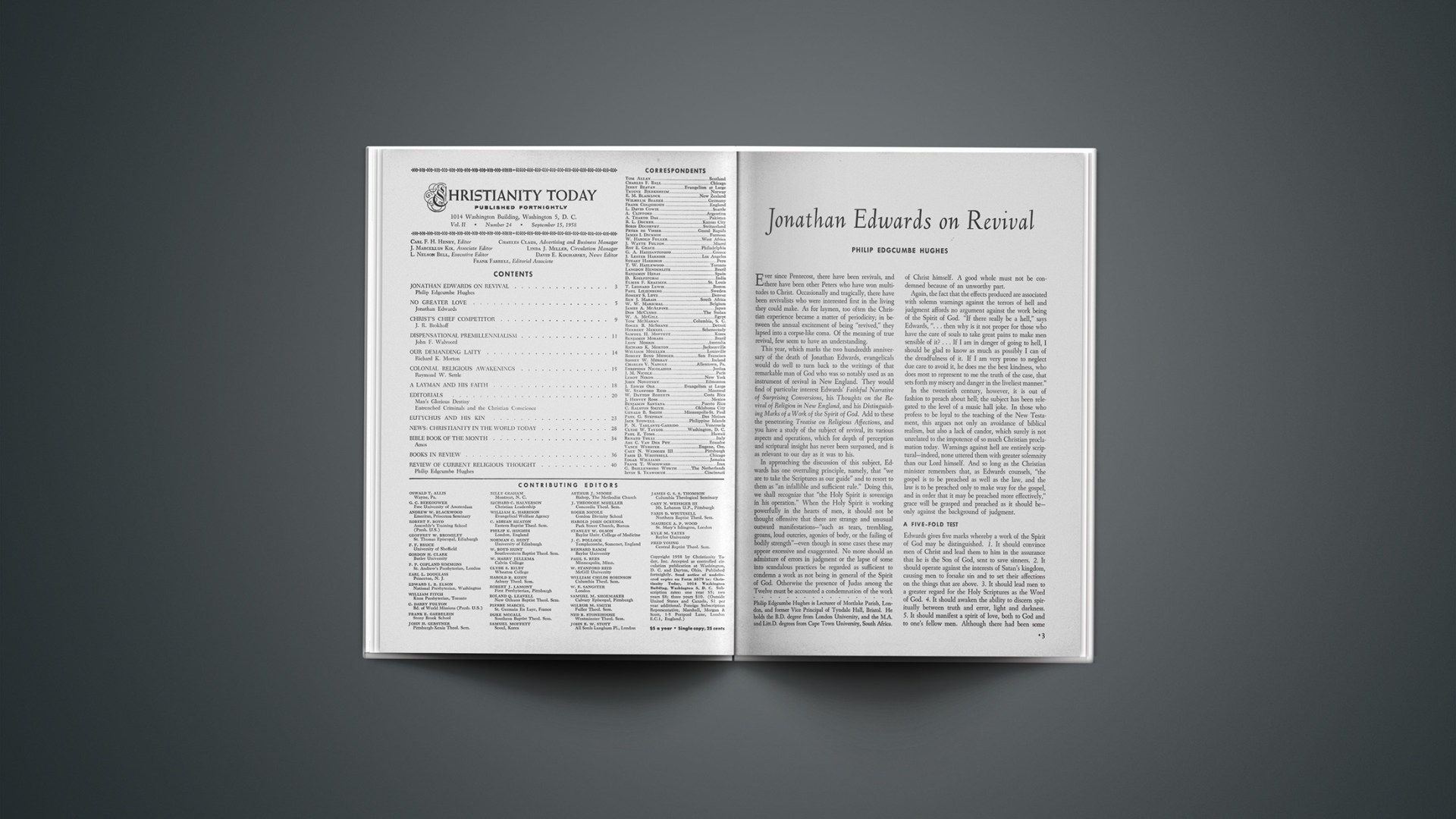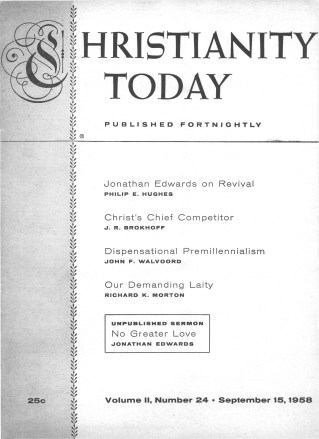Ever since Pentecost, there have been revivals, and there have been other Peters who have won multitudes to Christ. Occasionally and tragically, there have been revivalists who were interested first in the living they could make. As for laymen, too often the Christian experience became a matter of periodicity; in between the annual excitement of being “revived,” they lapsed into a corpse-like coma. Of the meaning of true revival, few seem to have an understanding.
This year, which marks the two hundredth anniversary of the death of Jonathan Edwards, evangelicals would do well to turn back to the writings of that remarkable man of God who was so notably used as an instrument of revival in New England. They would find of particular interest Edwards’ Faithful Narrative of Surprising Conversions, his Thoughts on the Revival of Religion in New England, and his Distinguishing Marks of a Work of the Spirit of God. Add to these the penetrating Treatise on Religious Affections, and you have a study of the subject of revival, its various aspects and operations, which for depth of perception and scriptural insight has never been surpassed, and is as relevant to our day as it was to his.
In approaching the discussion of this subject, Edwards has one overruling principle, namely, that “we are to take the Scriptures as our guide” and to resort to them as “an infallible and sufficient rule.” Doing this, we shall recognize that “the Holy Spirit is sovereign in his operation.” When the Holy Spirit is working powerfully in the hearts of men, it should not be thought offensive that there are strange and unusual outward manifestations—“such as tears, trembling, groans, loud outcries, agonies of body, or the failing of bodily strength”—even though in some cases these may appear excessive and exaggerated. No more should an admixture of errors in judgment or the lapse of some into scandalous practices be regarded as sufficient to condemn a work as not being in general of the Spirit of God. Otherwise the presence of Judas among the Twelve must be accounted a condemnation of the work of Christ himself. A good whole must not be condemned because of an unworthy part.
Again, the fact that the effects produced are associated with solemn warnings against the terrors of hell and judgment affords no argument against the work being of the Spirit of God. “If there really be a hell,” says Edwards, “… then why is it not proper for those who have the care of souls to take great pains to make men sensible of it?… If I am in danger of going to hell, I should be glad to know as much as possibly I can of the dreadfulness of it. If I am very prone to neglect due care to avoid it, he does me the best kindness, who does most to represent to me the truth of the case, that sets forth my misery and danger in the liveliest manner.”
In the twentieth century, however, it is out of fashion to preach about hell; the subject has been relegated to the level of a music hall joke. In those who profess to be loyal to the teaching of the New Testament, this argues not only an avoidance of biblical realism, but also a lack of candor, which surely is not unrelated to the impotence of so much Christian proclamation today. Warnings against hell are entirely scriptural—indeed, none uttered them with greater solemnity than our Lord himself. And so long as the Christian minister remembers that, as Edwards counsels, “the gospel is to be preached as well as the law, and the law is to be preached only to make way for the gospel, and in order that it may be preached more effectively,” grace will be grasped and preached as it should be—only against the background of judgment.
A Five-Fold Test
Edwards gives five marks whereby a work of the Spirit of God may be distinguished. 1. It should convince men of Christ and lead them to him in the assurance that he is the Son of God, sent to save sinners. 2. It should operate against the interests of Satan’s kingdom, causing men to forsake sin and to set their affections on the things that are above. 3. It should lead men to a greater regard for the Holy Scriptures as the Word of God. 4. It should awaken the ability to discern spiritually between truth and error, light and darkness. 5. It should manifest a spirit of love, both to God and to one’s fellow men. Although there had been some excesses in the course of the revival in New England, these five distinguishing marks of the work of the Spirit of God were clearly present, so that Edwards was able to conclude that what had taken place was “undoubtedly, in general, from the Spirit of God.”
Some, however, had complained that the gatherings at this time were marked by confusion and irregularity. But Edwards, while fully admitting the necessity for orderliness in the conduct of public worship under normal conditions, replied to this objection in the following way:
If God is pleased to convince the consciences of persons, so that they cannot avoid great outward manifestations, even to interrupting and breaking off those public means they were attending, I do not think this is confusion, or an unhappy interruption, any more than if a company should meet on the field to pray for rain, and should be broken off from their exercise by a plentiful shower. Would to God that all the public assemblies in the land were broken off from their public exercises with such confusion as this the next sabbath day! We need not be sorry for breaking the order of means, by obtaining the end to which that order is directed.
Necessity For Humility
He therefore warns us, where a work bears the marks of the activity of the Spirit of God, “by no means to oppose, or do anything in the least to clog or hinder, the work; but, on the contrary, do our utmost to promote it.” And those who are participating in the blessings and uplifting experience of such a work are warned against the great danger of spiritual pride, which is “the worst viper in the heart.” “The greatest privilege of the prophets and apostles,” says Edwards, “was not their being inspired and working miracles, but their eminent holiness. The grace that was in their hearts was a thousand times more their dignity and honour than their miraculous gifts.”
The necessity for humility is indicated by the fact that “God in this work has begun at the lower end, and he has made use of the weak and foolish things of the world to carry it on.” Some of the ministers chiefly employed were “mere babes in age and standing” and of little repute among their fellow ministers. Their weakness served to magnify the power and grace of God. Cold criticism of the human instruments used in this work and of the undesirable excesses which may be shown by those whose frail frames are visited by overwhelming and transforming experiences at such a time of revival springs from injured pride and from a failure to take the Holy Scriptures as the “sufficient and whole rule whereby to judge of this work.” Edwards observes significantly that “censuring others is the worst disease with which this affair has been attended.”
But the effects of a season of revival are not only to be seen in individual lives. They are apparent in the community as a whole. Thus Edwards describes how there was at the time of which he is speaking “a very uncommon influence upon the minds of a very great part of the inhabitants of New England, attended with the best effects.” Problems of juvenile delinquency and unruliness (so pressing in our day!) were largely solved: “In vain did ministers preach against those things before, in vain were laws made to restrain them, and in vain was all the vigilance of magistrates and civil officers; but now they have almost everywhere dropt them, as it were of themselves.”
Fruits Of Revival
It was also noticeable that in the greatest part of New England, the Bible was “in much greater esteem and use than before”; that the Lord’s day was “more religiously and strictly observed”; and that in a couple of years more was done in “making up differences, confessing faults one to another, and making restitution … than was done in thirty years before.” Large numbers were brought to “a deep sense of their own sinfulness and vileness,” and to a realization of “how unworthy in God’s regard were their prayers, praises, and all that they did in religion.” Many poor Indians and Negroes were converted and morally transformed, and very many little children led to love the Saviour. Multitudes, indeed, of all ages and classes of society, were brought to “a new and great conviction of the truth and certainty of the things of the Gospel.” Nor were these blessings confined to the new converts; they abounded also in the spiritual enrichment of the lives of great numbers of those who had been practicing Christians for years.
“And this,” writes Edwards, “has been attended with an abhorrence of sin, and self-loathing for it, and earnest longings of soul after more holiness and conformity to God, with a sense of the great need of God’s help in order to holiness of life; together they have had a most dear love to all that are supposed to be the children of God, and a love to mankind in general, and a most sensible and tender compassion for the souls of sinners, and earnest desires of the advancement of Christ’s kingdom in the world.”
Dignity And Depth
Here, we cannot but conclude, is the real thing. So much of the “revivalism” of our day seems to belong to a totally different category. We look in vain for the dignity, the depth, the solemnity, the self-abnegation, and the scripturalness that we find in Jonathan Edwards. Let us pray earnestly that Almighty God will turn us again, and bless us as in the days of old, and in his grace grant us to see the real thing once again in our day—a mighty, transforming work of the Sovereign Spirit!
Philip Edgcumbe Hughes is Lecturer of Mortlake Parish, London, and former Vice Principal of Tyndale Hall, Bristol. He holds the B.D. degree from London University, and the M.A. and Litt.D. degrees from Cape Town University, South Africa.










